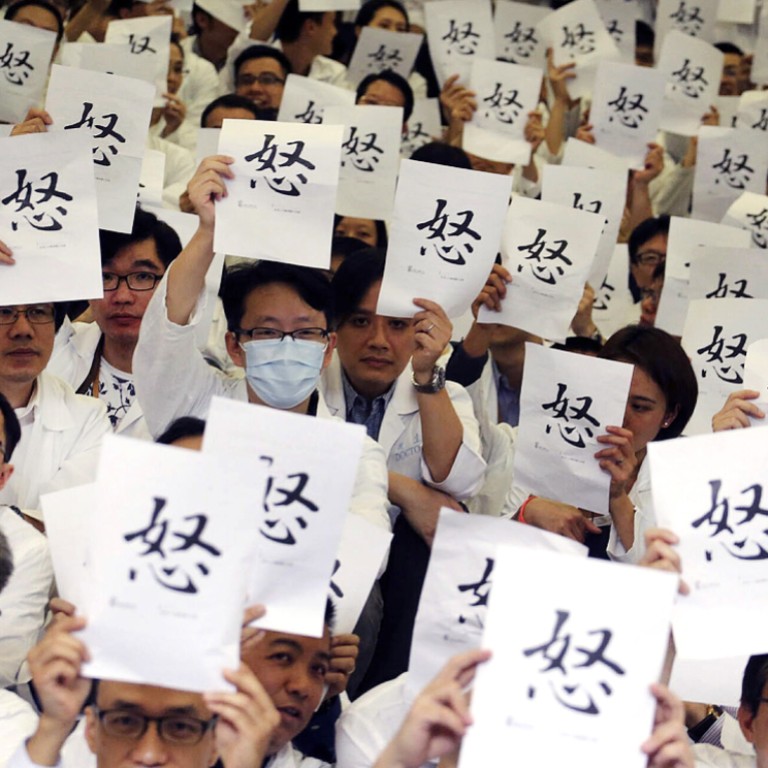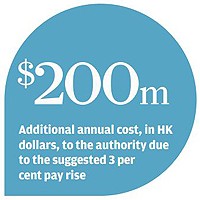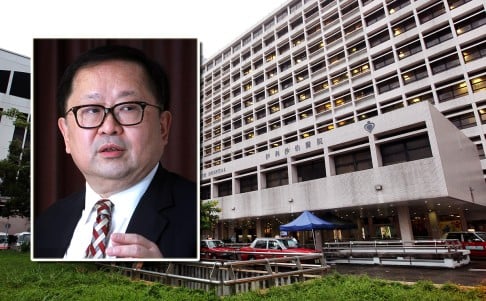
Doctors sit down and get results: Hong Kong Hospital Authority admits pay rise 'possible'
Protesters have Hospital Authority's word to seek 3 per cent wage rise
Senior public-sector doctors won their first big battle for better pay yesterday after 1,300 of them staged a sit-in that ended with a Hospital Authority pledge to seek board approval for a 3 per cent salary increase.
The protesters at Queen Elizabeth Hospital in Yau Ma Tei saw the city's top officials in health care administration - Secretary for Food and Health Dr Ko Wing-man, undersecretary Professor Sophia Chan Siu-chee and the authority's chief executive Dr Leung Pak-yin - turn up to listen to their demand.
Leung said it was "financially possible" for his publicly funded organisation to make such an adjustment after careful calculations and would submit a proposal to its board today.
"If the board agrees, the revision may take two to three months to be settled," he said.
READ MORE: Former Hong Kong minister says public doctors' salaries should be linked to those in private sector
Earlier, Ko said the government "agrees in principle" the authority would be able to raise doctors' pay with its own financial reserves. The authority must prove, however, it could sustain the extra costs, Ko said.
He added: "As the government is now funding the authority on a one-line vote, it will not allocate additional resources for this particular exercise."
Ko was referring to the yearly grants given to the authority and other government-subsidised organisations. The authority received HK$49 billion from the government for 2015-16.
The authority said the pay rise would cost an additional HK$200 million a year.
Dr Pierre Chan Pui-yin, president of protest organiser the Public Doctors' Association, said he was "pleased" with the positive replies from the officials.
He said the association would wait for the board's response before deciding whether to escalate its action - which might see senior doctors turn down non-clinical administrative work.
Earlier this month, the authority decided against upping their wages in line with the 3 per cent for senior civil servants that was based on the civil service's 2013 pay-level survey report. The once-every-six-years adjustment is in addition to annual pay adjustments.

Many medical heavyweights, including presidents of the Academy of Medicine and its colleges, deans of the medical schools of the University of Hong Kong and Chinese University, star medical professors and lawmakers added their voices to the appeal.
"We are here to support dignity and justice to the doctors … I can't see why doctors are incomparable to civil servants," HKU microbiologist Dr Yuen Kwok-yung said, whipping up the crowd and drawing lengthy applause.
Dr Donald Li Kwok-tung, president of the Academy of Medicine, told the South China Morning Post that current salary levels did not give enough recognition to doctors.
“[The salary] doesn’t reflect the extent of dedication to their work. Doctors are undervalued,” Li said.
He said most doctors were responsible for patients’ conditions even after working hours, putting them literally in a 24-hour work mode.
“In general, civil servants can wait till the next day [to continue business], but it is hard for doctors who are dealing with lives.”
In general, civil servants can wait till the next day [to continue business], but it is hard for doctors who are dealing with lives
He urged public hospital management to be more transparent over the responsibilities and salaries of doctors.
Former Hospital Authority chairman Anthony Wu Ting-yuk said the doctors’ expectations of increased pay were reasonable because their workload was heavy and salaries were lower than the levels offered in the private market.
"I think it is absolutely reasonable for them to expect a pay adjustment," he said during a Commercial Radio talk show on Wednesday.
Wu, who served as authority chief from 2004 to 2013, said that when the authority was established in the early 1990s, there was an understanding with the government that it should maintain doctors’ pay at levels close to those of civil servants.
He also said the authority had been following a government-commissioned pay trend survey, which serves as a benchmark for civil servants’ pay adjustments, every year.
Wu said the government would not have to give extra funds to the authority to foot the bill for the pay rise, which reportedly would cost HK$2 million. He said the authority had the money for the rise and the government only needed to give it the nod.
"I think the Hospital Authority should ask the government to give it flexibility to perform this [pay] adjustment," Wu said.
More than 1,000 people have signed an online petition urging the Hospital Authority to give an additional pay rise backdated for one year, similar to what senior civil servants are receiving.
Patient concern group Hong Kong Patients’ Voices also supported the sit-in, describing it as “shocking and disappointing” when the government and the authority ignore demands from public doctors.
The group was confident that the protest would not interfere with visits by patients to hospitals.

Dr Gabriel Leung, dean of the University of Hong Kong's faculty of medicine, said the doctors' request is "reasonable", and their professional contribution and effort should be reflected in the wage adjustment mechanism reasonably and fairly.
Other prominent medical figures, including Professor Lo Chung-mau, head of surgery at the University of Hong Kong, also backed the doctors’ action.
The 90-minute sit-in was to begin with a speech by Dr Pierre Chan Pui-yin, president of the Public Doctors’ Association, followed by opinions shared by other doctors and responses from authority representatives. Participating doctors were asked to wear white robes during the protest.
Speaking on the same radio show as Wu, Chan said most doctors hoped to follow the practice. He said that in 2007, doctors signed to follow the adjustment levels proposed in the civil service pay survey even though it led to a pay cut.

Chan said doctors were worried the authority was seeking to scrap the practice.
"The existing mechanism has been working for the past 20 years. That mechanism is for us to follow civil servants," Chan said.
"We do not want to argue every year like buying vegetables. We don’t have the time," he said.



